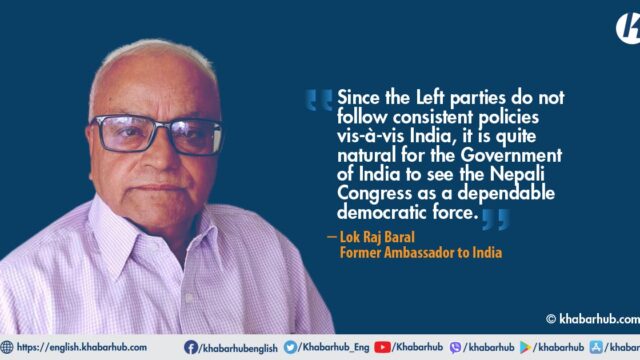Lok Raj Baral is a Professor of political science and former Ambassador of Nepal to India. He was associated with several think tanks and is an Executive Chairman of Nepal Centre for Contemporary Studies (NCCS), Kathmandu, Nepal.
He served as Professor and Chairman of the Department of Political Science at Tribhuvan University during 1976–1989.
He was also the President of the Nepal Political Science Association, Nepal Council of World Affairs, and Society for Constitutional and Parliamentary Exercises (SCOPE).
Professor Baral was a member of the delegation to the United Nations General Assembly in 1990 and International Research Committee member of the Regional Centre for Strategic Studies (RCSS), and also served as Nepal’s ambassador to India in 1996–1997.
He was Visiting Professor at the University of Illinois at Urbana-Champaign, the USA, and a Fellow at CHR Michelsen Institute, Bergen, Norway.
His previous publications include Nepal: Quest for Participatory Democracy (2006); Elections and Governance in Nepal (2005); Nepal: Political Parties and Parliament (2004); The Regional Paradox: Essays in Nepali and South Asian Affairs (2000); Nepal: Problems of Governance (1993); Regional Migrations, Ethnicity and Security (1990); and The Politics of Balanced Interdependence (1988).
Dr. Pramod Jaiswal, Strategic Affairs Editor at Khabarhub, spoke to Prof. Baral on Nepal-India Relations.
What does the new government led by Prime Minister Sher Bahadur Deuba mean for India? How does India plan to engage with the new government?
Since the Left parties do not follow consistent policies vis-à-vis India, it is quite natural for the Government of India to see the Nepali Congress as a dependable political force.
Moreover, Nepali Congress cannot choose China at the cost of India or can play cards against both neighbors.
The ‘China factor’ also comes into the picture as China is aggressively pursuing its foreign and economic policies with a view to standing up to the United States.
Other than limiting China’s influence in Nepal, at the moment what may be India’s priorities in Nepal?
India’s new priorities in Nepal should be marked with an understanding of the geopolitical context.
Nepal cannot adopt the Chinese political model, nor can it claim as the champion of Xi Jinping Thoughts as accepted by the major Left parties – Communist Party of Nepal (Unified Marxist–Leninist) and Communist Party of Nepal (Maoist Centre).
India should try to modify its conventional policies towards Nepal by trying to find out a mutually acceptable alternative.
How will India’s integrated check posts enhance trade and connectivity between Nepal and India and what are its challenges?
One of the problems of India-Nepal economic cooperation is unnecessary delay in completing the projects.
The integrated check posts if implemented fully would definitely ease the nagging trade and transit problems.
Unfortunately, they are not completed as yet. It’s been more than three since EPG finalized a joint report with recommendations aimed at redefining the Nepal- India bilateral ties.
However, the group hasn’t been able to present its report to the prime ministers of both countries.

It has created lots of noise in Kathmandu. What is the reason behind this delay? Do you think the EGP report has any relevance? Should it be accepted?
We don’t know the content of the Eminent Persons Group (EPG) Report. Why were the EPG members so anxious to present it to the Prime Minister of India, Narendra Modi first? They could have submitted it to the ministries concerned. Moreover, the Report seems to be unacceptable to the Government of India, presumably, the Modi Government does not like to change the structural relations enshrined in the Treaty.
India has made a rapid economic transformation in the last 2-3 decades placing itself as the world’s fifth-largest economy. With the high rate of India’s economic rise, the aspirations of its neighbors, including Nepal have increased. Hence, how can India and Nepal work together for the economic transformation of Nepal?
The first problems lie with Nepal as it has not been able to accelerate its economic development as fast as its neighbors are doing.
Too much politics and too little attention paid to development have hampered Nepal’s growth.
Internal situation matters a lot foreign and economic policies too. Nepal and India should rely on cooperative and coordinated approaches to development.
At a time when India and Nepal are struggling with COVID19, how can India help Nepal in vaccinating the Nepali people through India’s Neighbourhood First policy and Vaccine Diplomacy?
In vaccine diplomacy, India is behind China. Thus, India should try to reach out to the maximum Nepali people by making available as many vaccine doses as possible.
PM Modi’s first official visit to Nepal was after almost two decades and he has made four official visits to Nepal in four years. It looks like Nepal receives special attention from the BJP government under PM Modi. What is your take on this?
It was wrong on the part of the then Man Mohan Singh government to ignore a neighbor like Nepal.
Frequencies of visits alone do not improve relations unless backed by mutually agreeable agendas.
Prime Minister Narendra Modi’s visits have not paid dividends to Nepal-India relations. It is back to square one.









Comment